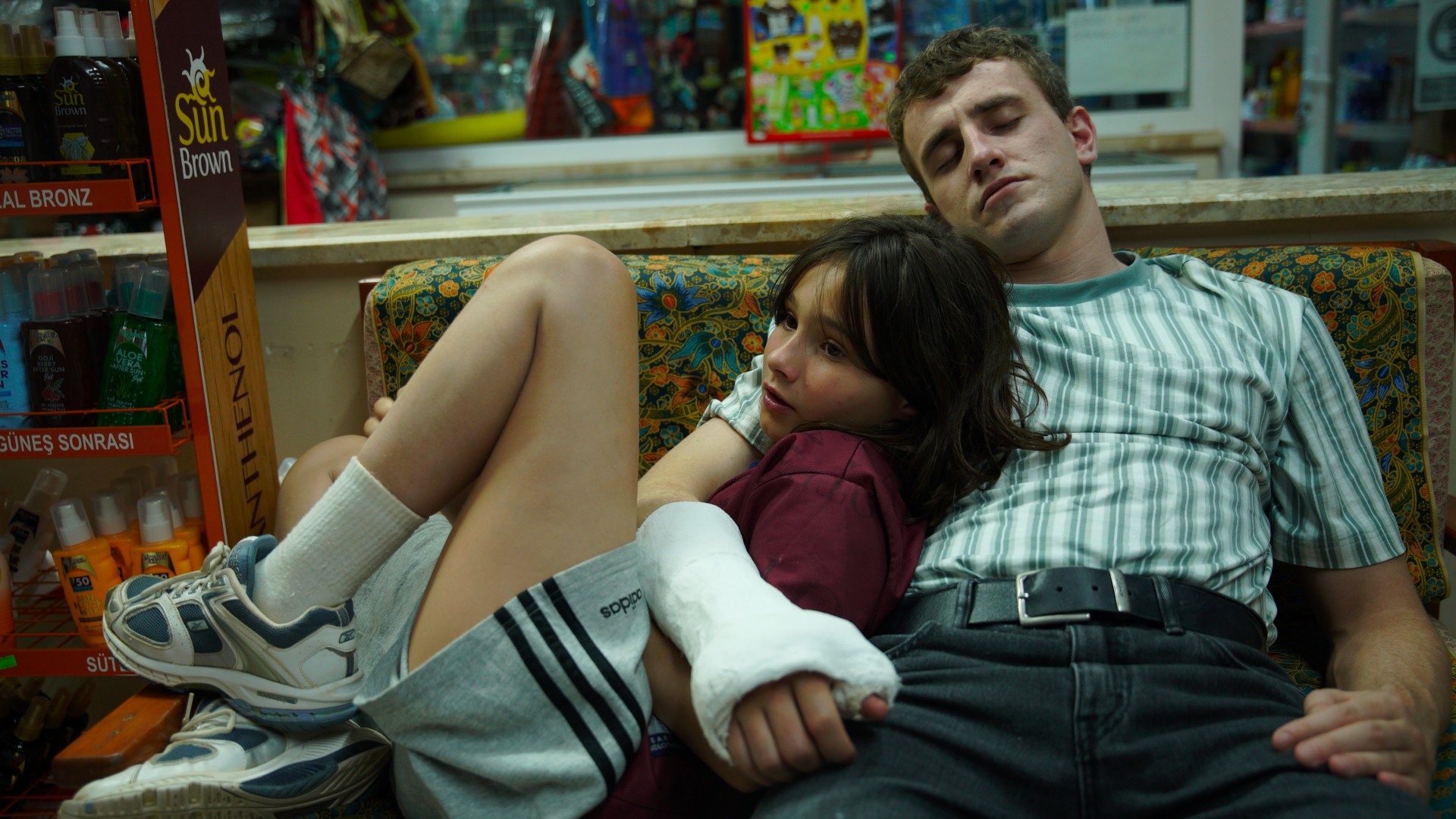GamesRadar+ Verdict
Charlotte Wells’ blinding debut is a subtly potent paean to memory and summer hols.
Why you can trust GamesRadar+
It’s hard to overstate the transportive effect of aftersun. That aloe vera scent instantly conjures crystal-clear memories of cold cream slathered onto hot, tender skin. A Proustian rush in a squeezy bottle. Holiday memories distilled. Charlotte Wells’ beguiling debut feature, Aftersun, does a similarly effective job of teleporting you to a resort and a time period so vividly evoked, you’ll swear you’ve been on that all-inclusive to Turkey yourself.
The holidaymakers in question here are (just-turned) 11-year-old Sophie (Frankie Corio), and her father, Calum (Paul Mescal), spending time together on a budget vacation in the late ’90s. The film opens with camcorder footage of Sophie interviewing her pa, and – setting the tone for what’s to follow – what’s unsaid hangs heavily in the air of the no-frills hotel room.
These grainy snapshots are revisited again throughout the film, sometimes in the moment via the foldout LCD screen, and sometimes in sparingly used flash-forwards to the present, in which an adult Sophie (Celia Rowlson-Hall) reflects on that time, attempting to untangle truth from memory.
For the most part, the events are restricted to the week or so spent on a generic but clearly memorable summer excursion at a tired resort. But those flash-forwards are enough to load even casual conversations with added resonance. Only 20 years her senior, Calum often gets mistaken for Sophie’s brother. His general demeanour adds to that effect, too.
During their break, incident is in short supply, though the film is no less gripping for it. For the most part, dad and daughter lay back on sunloungers, shoot pool, sample the evening’s ropey entertainment and make the occasional day trip. Sophie and Calum’s relationship is the backbone of the film. There’s a believable intimacy there, but also a persistent ambiguity.
Wells scatters clues everywhere, but rarely unveils definitive answers. You’re obliged to draw conclusions, no doubt coloured by your own personal experiences. When the film begins, Calum’s arm is in plaster. While the injury’s provenance is never fully explained, it’s one of several hints towards the demons that he struggles with. While affable and laid-back, darkness haunts his edges. In one throwaway moment, he casually tells a scuba instructor that he doesn’t expect to make it to 40. Occasionally we witness a recklessness that makes that statement believable.
Quite how things went down between Calum and Sophie’s mother is similarly opaque, but he no longer lives with them in Scotland. But despite how it might sound, these teasing details never frustrate. It’s not that kind of film. And besides, Mescal and Corio are too magnetic a pairing for eyes and minds to wander elsewhere.
Bringing all the latest movie news, features, and reviews to your inbox
Mescal, continuing to steer his post-Normal People stardom towards chewy material, is low-key superb. He pulls off quiet, subtle moments that suggest a torment beneath the surface. He’s also liable to break out into goofy dad dancing or tai chi moves.
Corio, meanwhile, delivers one of the great childhood performances in recent memory. Charming, funny, smart and remarkably unaffected, she’s wonderful as our window into this world, giving a child’s-eye-view of a life just outside her comprehension. Whether shooting the breeze with her dad, befriending the older kids by the resort’s amusements or singing karaoke, she’s utterly without artifice. However Wells conjured the performance from her, it’s a resounding achievement for all involved.
Perhaps what makes the central relationship so easy to invest in is the extraordinarily specific sense of time and place. The resort will feel familiar to anyone who has ever flashed a yellow wristband at a bar in exchange for a drink, or listened to the patter of a holiday rep on a midnight coach. Billur Turan’s ’90s production design is on point throughout, as are Frank Gallacher’s costumes: Frankie’s wardrobe of oversized printed tees feels exactly right. There’s a pinpoint-precise attention to detail throughout.
But really, it’s a film that evades objective analysis. Wells has crafted a feature that gets its hooks into you before you’ve had a chance to work out what it’s doing. On the one hand, it’s grappling with the reliability of memory and the gulf that exists between parents and children. On the other, it’s a story of a pre-teen and pre-adult, each at their own crossroads. And it’s also about a respite from the imperfections and disappointments of everyday life, to which we inevitably must return at the conclusion of every holiday.
In the end, though, it’s not a film that needs to be overthought. As the close nears, its emotional sucker punch manifests, aided by a sublime Queen/David Bowie needle drop and an understated visual metaphor that really lingers. This is an experience you won’t forget in a hurry.
More info
| Genre | Drama |
Matt Maytum is the former Editor of Total Film magazine. Over the past decade, Matt has worked in various roles for TF online and in print, including at GamesRadar+. Bucket-list-ticking career highlights have included reporting from the set of Tenet and Avengers: Infinity War, as well as covering Comic-Con, TIFF and the Sundance Film Festival.




